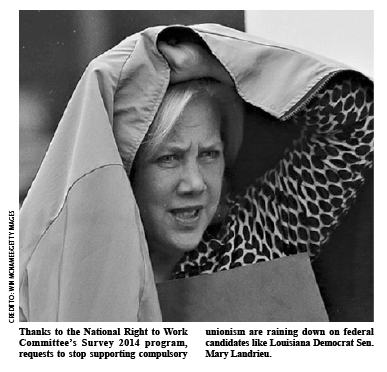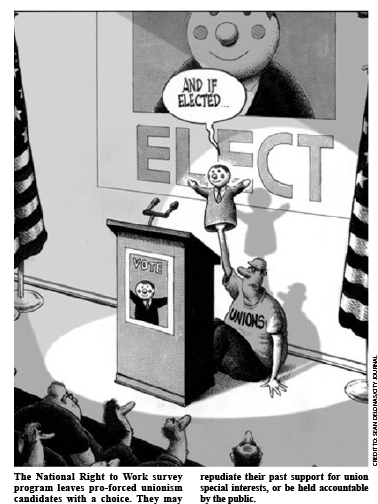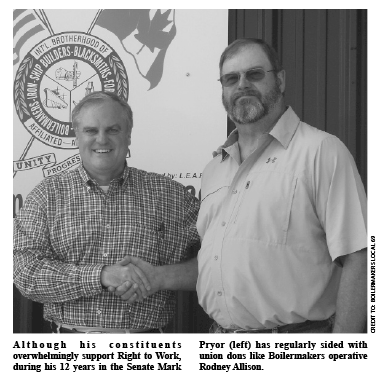Is This Any Way to Run a City’s Schools?
Leaked CTU Proposals Won’t Do Anything to Improve Schools’ Poor Performance
Survey Results in, Committee Members Put Heat on the Candidates
(source: October 2014 National Right to Work Committee Newsletter)
With the results of the National Right to Work Committee’s federal Survey 2014 now in, Committee members from coast to coast keep turning up the heat on U.S. Senate and House candidates to publicly pledge 100% support for the Right to Work.
By the time they have the opportunity to read this month’s Newsletter, the vast majority of Committee members and supporters should already have received in the mail a Survey 2014 results roster informing them whether and how their federal candidates have responded to the Right to Work survey.
 Pro-Right to Work Americans who have not yet received their Survey 2014 results may obtain a copy by contacting the Committee by e-mail — Members@NRTW.org — or by dialing 1-800-325-7892.
Pro-Right to Work Americans who have not yet received their Survey 2014 results may obtain a copy by contacting the Committee by e-mail — Members@NRTW.org — or by dialing 1-800-325-7892.
By calling, writing and visiting their candidates and urging them to declare themselves in opposition to Big Labor special privileges, Committee members are making forced unionism and the Right to Work important issues in state after state this year.
Right to Work Activity Key to Stopping Big Labor
At this writing, just a few weeks remain until Election Day.
And reports from a wide array of pollsters and pundits indicate that the congressional caucus of politicians who support Big Labor’s agenda on forced-unionism issues will shrink after voters go to the polls next month.
Consequently, Right to Work advocates and their allies will likely continue to be able in 2015 and 2016, as they have been throughout the Obama Administration, to block Big Labor legislative power grabs like federally-mandated “card checks” on Capitol Hill.
However, Big Labor President Barack Obama will, of course, retain the power until January 2017 to promote compulsory union membership by issuing executive orders and by appointing forced-unionism apologists to powerful federal agencies such as the National Labor Relations Board (NLRB).
Congress has the constitutional authority to thwart the President from unilaterally giving away the store, but doing so requires a strong commitment to principle on the part of senators and representatives.
“Changes in Congress that are merely unfavorable to Barack Obama’s Democratic Party won’t nearly suffice to turn back the tide of forced unionism if his Big Labor cheerleaders on the NLRB retain the power to rewrite federal labor law bureaucratically,” observed Committee President Mark Mix.
And since certain union power grabs such as police/fire monopoly-bargaining legislation, which would corral into unions currently independent public-safety officers across the country, are backed by many GOP politicians as well as virtually all Democrats, their passage remains a danger.
“Whatever happens on November 6, Right to Work activity will remain critical for stopping the expansion of forced unionism.”
 Two Union-Label Senators Now Trail Pro-Right to Work Challengers in Polls
Two Union-Label Senators Now Trail Pro-Right to Work Challengers in Polls
This fall, Right to Work supporters hoping to enhance their ability to fight forced unionism over the next two years have multiple opportunities in U.S. Senate contests.
Just to start with, the current senators with pro-forced unionism records are, according to the latest polls, trailing in their re-election campaigns against 100% pro-Right to Work challengers.
Big Labor Louisiana Democrat Mary Landrieu is in the worst shape. Ms. Landrieu, who is seeking a fourth Senate term, has a long record of backing union special-interest legislation.
For example, in 2009 Ms. Landrieu voted to kill a national Right to Work law amendment sponsored by then-Sen. Jim DeMint (R-S.C.) and thus forced hardworking Americans to continue paying union dues or fees just to get a job or keep their job.
And in 2011 Ms. Landrieu was one of 54 senators who voted to give the Obama NLRB a green light to rewrite longstanding rules for how Big Labor acquires monopoly-bargaining control over workers in order to make it far easier for union organizers to accomplish that objective.
Recent surveys indicate she is running behind GOP challenger and national Right to Work law cosponsor Congressman Bill Cassidy.
Most of the latest polls also show another union-label senator, Arkansas Democrat Mark Pryor, trailing a GOP challenger who unabashedly opposes forced unionism.
Congressman Tom Cotton, like Mr. Cassidy a Right to Work law cosponsor, has a small lead over Mr. Pryor.
Both Ms. Landrieu and Mr. Pryor voted for the “Card Check” Unionization Bill that would have virtually eliminated secret-ballot voting for union certification and handed Big Labor a huge new weapon to force workers into unions.
Ms. Landrieu was even a cosponsor of this anti-worker measure.
At Least Two ‘Open’ Senate Seat Gains Likely For Right to Work
There are also several Right to Work opportunities to pick up “open” U.S. Senate seats that have up to now been under union lobbyists’ control.
In Montana and South Dakota, 100% pro-Right to Work candidates are now leading by substantial margins in contests for Senate seats now held by opponents of Right to Work.
The candidates who are standing up to the union bosses are U.S. Rep. Steve Daines (R-Mont.) and former Gov. Mike Rounds (R-S.D.). Their Organized Labor-backed Democrat rivals are state Rep. Amanda Curtis (D-Mont.) and businessman Rick Weiland (D-S.D.).
In a third “open” seat race in Iowa, forced-unionism foe and state Sen. Joni Ernst (R) is running neck-and-neck in a contest against pro-union monopoly Congressman Bruce Braley (D) to determine the successor of Big Labor “go-to” U.S. Sen. Tom Harkin (D).
To build a Senate firewall against compulsory unionism, the Right to Work movement will need to be effective at defense as well as offense in 2014.
Three Senate Seats Currently Held by Right to Work Allies Targeted by Union Hierarchy
In Kansas, GOP Sen. Pat Roberts, who resolutely opposes forced unionism, is locked in a tight race with union boss-backed Independent candidate Greg Orman, who is refusing to say how he will vote on Right to Work-related issues.
A second pro-Right to Work incumbent facing an aggressive challenge is Kentucky Republican Mitch McConnell, the Senate minority leader. This fall Big Labor is pouring forced-dues money into Secretary of State Alison Grimes’ campaign to unseat him, and recent polls indicate he leads only by a small margin.
Yet another union-boss target is the U.S. Senate seat held by anti-forced unionism Georgian Saxby Chambliss, who is retiring. In the race to replace him, 100% Right to Work supporter David Perdue (R) holds only a slight lead over Michelle Nunn (D), who refuses to say how she will vote regarding Big Labor special privileges.
Committee Rallies Members To Put Heat on Candidates
The eight states discussed above are just some of those where the Senate survey program is in high gear this fall.
In several other states like Alaska and New Hampshire, where neither major-party Senate nominee has yet made a commitment to support Right to Work, Committee leaders remain cautiously optimistic that at least one candidate will make such a pledge by Election Day, so pro-freedom voters have a choice.
And Committee strategists continue to monitor states like New Mexico, Oregon and Minnesota, where there is a strong contrast between the fall candidates on the Right to Work issue, but where polls currently indicate the race will not be close. If the polls close, the Committee will be ready.
The National Right to Work Committee and its members (now 2.8 million) are determined to ensure that federal politicians who carry water for Big Labor are held accountable this fall.
The principal Committee program for holding politicians’ feet to the fire is the federal candidate Survey 2014.
The ongoing Survey 2014 consists of three phases.
In the first phase, candidates received questionnaires asking them how they intended to vote on a short list of forced unionism-related issues, including national Right to Work legislation, mandatory “card checks,” and federalized public-safety union monopoly bargaining.
“The Committee’s goal is to forge increased support for Right to Work in the Senate and House,” explained Mr. Mix.
“That’s why the Right to Work survey raises the pressure on candidates to oppose the expansion of Big Labor’s forced-unionism privileges, and also to support rolling those privileges back.”
In the second phase of the Survey 2014, Committee members called and wrote the candidates, asking them to answer their questionnaires 100% in favor of Right to Work.
In the final phase, the Committee, through TV and newspaper ads, e-mails and the Postal Service, is reporting back to members and friends at the local level on how their candidates responded. That keeps the heat on non-responsive candidates to take a clear stand on the Right to Work issue.
Public Doesn’t Support Compulsory Unionism
“Big Labor has far more money at its disposal than do Right to Work supporters, but the union bosses have one major problem: The general public, and even the workers they claim to represent, don’t support what they are selling,” said Mr. Mix.
“Poll after poll shows that nearly 80% of Americans agree that no one should be forced to join or pay dues to a union, simply in order to keep his or her job.
“With members’ generous support, I’m confident that this fall the federal survey will convince candidate after candidate to pledge to stop attacking employees’ Right to Work, and candidates who refuse will be held accountable by the public.”

Leaked CTU Proposals Won’t Do Anything to Improve Schools’ Poor Performance

Wherever Big Labor wields the power to collect forced union dues, union bosses funnel a large share of the confiscated money into efforts to elect and reelect business-bashing politicians. Employment growth tends to lag as a consequence.

Members Insist They Keep Pro-Right to Work Campaign Promises